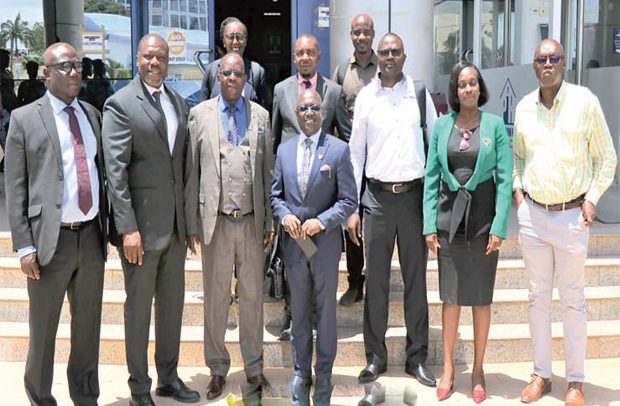The NIA officials and their guests
The National Identification Authority (NIA) has hosted a delegation from the Zambia Refugee Commission, as part of their effort to learn from the refugee registration template of the Authority.
The meeting served as a platform for the Executive Secretary of NIA, Prof. Kenneth Agyemang Attafuah, to express NIA’s unwavering commitment to assisting the Zambian delegation in improving the well-being of refugees within their nation.
During the interaction, Prof. Attafuah elucidated the collaborative efforts between the Ghana Refugee Board and NIA in overseeing refugee registration in Ghana. He underscored the delegation’s objective to acquire knowledge about Ghana’s practices in registering refugees, enhancing their economic activities, modernising settlements, streamlining documentation, and eliminating barriers impeding their mobility and quality of life.
Prof. Attafuah provided valuable insights into the establishment and mission of the NIA, emphasising the role of identity-related issues in Ghana’s historical political crises. He emphasised the crucial significance of ensuring the integrity of the electoral process and revealed that NIA has successfully registered a remarkable 17.37 million individuals, out of a total population of 19 million, with 16.7 million Ghanaians already in possession of their identification cards.
Furthermore, Prof. Attafuah shared plans for upcoming registration initiatives, including the registration of Ghanaian children aged 15 to 18 and the subsequent registration of those aged 6 to 14, set to commence on June 1, 2023. He also shed light on the ongoing efforts to register Ghanaians residing abroad as well as foreign nationals residing in Ghana.
Leading the delegation, Prof. Prosper Ng’andu, the UN High Commissioner of Refugees in Zambia, emphasised the need for policymakers and practitioners to shift their perception of refugees from being viewed as a “burden” to recognising the potential they hold as an opportunity. Prof. Ng’andu emphasised that with appropriate investments and well-crafted policies, the integration of refugees can yield substantial economic dividends.
Prof. Ng’andu also highlighted the Zambian government’s perspective, which views refugees as a valuable resource that can be effectively managed to contribute to the country’s economy. He emphasised the necessity of digitising refugee information and centralising it within a unified platform, akin to Ghana’s implementation of the Ghana Card, in order to facilitate proper management and provide comprehensive support to refugees.

